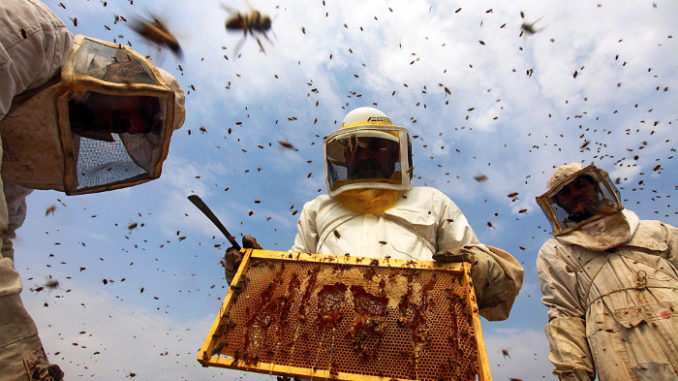
By Ginika Okoye
Mr David Musa, the Team Leader, USAID Bee Keeping Pollination Project, says Nigeria can generate over 10 billion dollars from local and international trade in honey and other hive products.
Musa disclosed this during an interview on the sideline of a Capacity Building Workshop for bee-farmers in Goshen, Nasarawa State on Thursday.
“Honey trade can generate up to 10 billion dollars if you look at cumulative values from honey and other hive products and the value of pollination,” he said.
The team leader is also the Public Relations Officer of the Nigeria Apiculture Platform.
He disclosed that the domestic consumption rate of honey in the country was currently 380,000 tonnes, with a global price of about 4.5 billion dollars.
He stressed the need for the country to get honey export certification from the European Union, adding that it would give credibility to the forthcoming largest Africa Apiculture Trade to be hosted by Nigeria in 2018.
“Nigeria is going to host the largest bee keeping trade in Afric; it is the largest platform that will bring together many bee keeping enterprises.
“It will put Nigeria on the global bee keeping map.
“The EU certificate is one of the highest levels of certification and it is necessary to get that.
“Nigeria consumes about 380,000 tonnes of honey a current global price of about 4.5 billion dollars and that is just domestic consumption of honey; we have not gone into industrial production, cosmetics, and pharmaceuticals,” he said.
Also speaking, Alhaji Mohammed Mahmud, a bee-farmer and participant at the workshop, commended the Federal Government and the Nigerian Export Promotion Council (NEPC) for the workshop.
Mahmud, who is also the House Committee Chairman on Population and National Identity Card, assured that necessary legislation that would drive the bee farming industry would be looked into by the National Assembly.
He said that the Federal Government had made necessary provision in the 2017 budget to establish standard laboratory to test hive products before exportation.
“This programme is coming at the appropriate time because many people do not know about bee farming.
“The workshop has come to educate bee keepers like I, on the techniques, problems and prospects to move the industry and country forward.
“The workshop has come out with the position of looking at all the existing laws that governs the bee industry.
“We want to look at it together and see what changes can be made to make the industry move forward.
“I want to assure you that we will do our best to make sure that necessary legislation for the bee industry will be taken care of.
“Part of the problems that the industry has is trying to set up a laboratory where you can test the product that you want to export and this has been taken care of in the 2017 budget,” he said.
Other bee farmers and participants at the workshop expressed regret over the constant neglect of bee farming.
They called for more support from the federal and state governments to make the trade attractive to many farmers.
The News Agency of Nigeria reports that the workshop is a three-day programme tagged: ‘EU Third Country Listing;’ An Eligibility Criteria to Export Honey to the EU Market.
NAN
